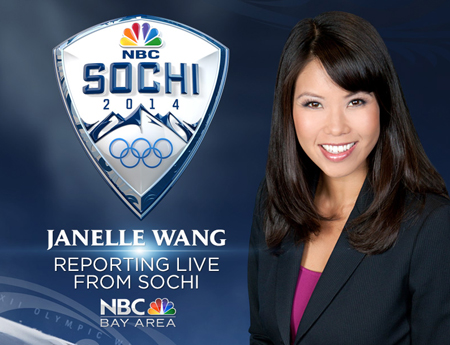NBC Station Reporters Check in From Russia, With Love

The smarter way to stay on top of broadcasting and cable industry. Sign up below
You are now subscribed
Your newsletter sign-up was successful
While the Olympics is the quintessential global story, it remains very much a local one for the station reporters situated in Sochi. The NBC-owned stations, backed by Comcast, sent a whopping crew of 25 there—and the reporters are looking around every corner for hometown angles. Bruce Beck, WNBC New York sports director who is working his sixth Games, mentions the Liberian sprinter, and flag bearer, in London’s Summer Games who had attended St. John’s University.
“You’re always looking for some thread,” he says.
The NBC stations crew ranges from serious Olympics veterans, such as Beck, to first-timers such as Janelle Wang (pictured left), KNTV San Francisco-San Jose anchor. Covering northern California’s 20 Team USA members, she’s finding muscles, and energy sources, she didn’t know she had; Wang did eight live shots Feb. 6, she said, along with batches of teases and look-lives. “I’ve never worked so hard in my life,” says Wang. “I’m exhausted and excited at the same time.”
Valari Staab, president of NBCUniversal Owned Television Stations, said the group “will provide a localized perspective on a global event, personalizing the Games in a meaningful way for our viewers at home.”
Other groups, such as Hearst TV and Gannett, have crews in Sochi too.
The reporters are navigating a tricky nine hour time difference from the eastern U.S. Vai Sikahema, WCAU Philadelphia anchor, is on at 8 a.m. Sochi time, appearing in the 11 p.m. news back in Philadelphia. He later does half-hourly hits in the 3:30-7 a.m. show before winding down his day. “The days are long,” Sikahema says, “but it sure is fun.”
Philadelphia does not have nearly as many Team USA members as northern California or New York, so the WCAU crew gets creative when finding local angles, such as profiling a man from the Philly market who worked on Team USA’s bobsled design.
The smarter way to stay on top of broadcasting and cable industry. Sign up below
Much has been made of Russia not being quite ready to reveal itself to the world as the Games kick off Feb. 7, but the local TV vets say a little wet paint is par for the course—Sikahema mentions men painting the stadium as media entered Olympic Stadium in Athens for the opening ceremonies in 2004. “I think the world will see Sochi ready,” says Sikahema, who is covering his eighth Olympics.
NBC employees may be particularly well treated as part of the Games’ partner network, but the reporters on site say accommodations—another question mark stemming from Sochi—have been perfectly adequate. Wang mentions the unique feeling of being the first to occupy her hotel room. And while her shower initially offered no cold water, a worker fixed it almost immediately after being notified.
“All this talk about no running water and the hotels are an abomination—it’s not true,” says Beck. “Sochi is not St. Kitt’s, but it’s clean, we have space, we have hot water.”
Efficient shuttle transportation, he adds, frees up more time to work on stories.
The reporters also cite minimal concerns about security, crediting NBC for a comprehensive plan. “If we’re vigilant and smart and stay within the confines we’re told to, I think we’re fine,” Beck says.
Another popular Sochi-isn’t-ready story—the supposedly wild dogs that, if reports are to be believed, traipse the Sochi landscape in hungry packs—may also be overblown. Wang says some casual reporting reveals that local people simply let their dogs roam more than Westerners might. “They’re very friendly,” she says. “They look like people’s pets.”
Even with adequate accommodations, the media types are in for a brutal few weeks—running on adrenaline, and not a lot of sleep. Beck mentions wrapping up the Super Bowl and all of its ancillary madness in his home market, then heading to Russia a half day later. “It’s a challenge physically, mentally, spiritually,’” he says. “You have to pour yourself into it. You have to love the stories and love the people.”
Sikahema, a former NFL player, has covered Super Bowls and World Series, NBA Championships and Stanley Cups. He says nothing compares to seeing so many nations united in sport, and the feeling of watching the national squads enter the stadium behind their flag.
“There’s nothing like the Olympics,” he says.
Michael Malone is content director at B+C and Multichannel News. He joined B+C in 2005 and has covered network programming, including entertainment, news and sports on broadcast, cable and streaming; and local broadcast television, including writing the "Local News Close-Up" market profiles. He also hosted the podcasts "Busted Pilot" and "Series Business." His journalism has also appeared in The New York Times, The L.A. Times, The Boston Globe and New York magazine.

